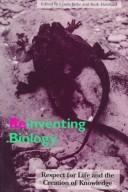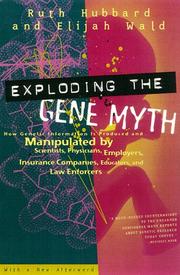| Listing 1 - 4 of 4 |
Sort by
|

ISBN: 0253209811 Year: 1995 Volume: *3 Publisher: Bloomington ; Indianapolis Indiana University Press
Abstract | Keywords | Export | Availability | Bookmark
 Loading...
Loading...Choose an application
- Reference Manager
- EndNote
- RefWorks (Direct export to RefWorks)
Reeds in haar vroegste stellingnamen beweerde de feministische wetenschapskritiek dat de inbreng van vrouwelijke onderzoekers het theoretisch kader, de praktijk en de resultaten van het wetenschappelijk onderzoek drastisch zou wijzigen. In "Reinventing biology" toetsen de biologen Lynda Birke en Ruth Hubbard deze bewering aan de biologie. Zij gaan meer bepaald na hoe het biologisch onderzoek eruit zou zien als wetenschappers de voorwerpen van hun onderzoek - of dit nu dieren, planten, bacteriën of mensen zijn - niet zouden beschouwen als passieve objecten die volledig verschillen van de onderzoekers zelf, maar als actieve partners in het onderzoek, met een eigen geschiedenis, een eigen integriteit, het vermogen te reageren op de buitenwereld en in bepaalde gevallen zelfs met een eigen intelligentie. 13 auteurs uit verschillende disciplines benaderen deze vraagstelling op uiteenlopende wijzen: zo gaat Anne Fausto-Sterling bijvoorbeeld in op de zin en onzin van dierenexperimenten; een historisch artikel confronteert de traditionele scheiding tussen cultuur en natuur, tussen subject en object met de extreme gevolgen van de Nazi-theorieën over 'wilde' en 'getemde' natuur; een ander artikel pleit ervoor om de imperialistische drang van de moderne wetenschap, die erop gericht is flora, fauna en volkeren uit andere gebieden uit te buiten, om te buigen tot een democratische wetenschap die rekening houdt met feministische, ecologische en ontwikkelings-perspectieven.
Animal-human relationships --- Animal-man relationships --- Animals and humans --- Human beings and animals --- Human-animal relationships --- Man and animals --- Man-animal relationships --- Mens-dier relaties --- Relations homme-animal --- Relationships [Human-animal ] --- Animal experimentation --- Biology --- Human-animal relationships. --- Moral and ethical aspects. --- Philosophy. --- Research. --- History --- Political philosophy. Social philosophy --- Pure sciences. Natural sciences (general) --- Zoology --- General ethics --- Sociology of occupations --- Philosophy of science --- Moral and ethical aspects --- Philosophy --- Research --- Ethics --- Nazism --- Academic sector --- Exact sciences --- Book --- Animals --- Epistemology

ISBN: 0807004316 Year: 1999 Publisher: Boston (Mass.) : Beacon press,
Abstract | Keywords | Export | Availability | Bookmark
 Loading...
Loading...Choose an application
- Reference Manager
- EndNote
- RefWorks (Direct export to RefWorks)
Medical genetics --- Medical genetics --- Moral and ethical aspects. --- Social aspects.
Book
ISBN: 0870738968 Year: 1979 Publisher: Cambridge Schenkman
Abstract | Keywords | Export | Availability | Bookmark
 Loading...
Loading...Choose an application
- Reference Manager
- EndNote
- RefWorks (Direct export to RefWorks)
316 --- #MILO:GIFT MALINA/89 --- Sociologie --(algemeen) --- Feminism. --- Sexism. --- Women --- Physiology --- Philosophy. --- 316 Sociologie --(algemeen) --- Feminism --- Sexism --- Human females --- Wimmin --- Woman --- Womon --- Womyn --- Females --- Human beings --- Femininity --- Sex bias --- Attitude (Psychology) --- Prejudices --- Sex (Psychology) --- Social perception --- Sex role --- Emancipation of women --- Feminist movement --- Women's lib --- Women's liberation --- Women's liberation movement --- Women's movement --- Social movements --- Anti-feminism --- Physiology&delete& --- Philosophy --- Emancipation
Book

ISBN: 0674071093 0674067762 9780674067769 9780674064461 0674064461 Year: 2013 Publisher: Cambridge, MA
Abstract | Keywords | Export | Availability | Bookmark
 Loading...
Loading...Choose an application
- Reference Manager
- EndNote
- RefWorks (Direct export to RefWorks)
Can genes determine which fifty-year-old will succumb to Alzheimer's, which citizen will turn out on voting day, and which child will be marked for a life of crime? Yes, according to the Internet, a few scientific studies, and some in the biotechnology industry who should know better. Sheldon Krimsky and Jeremy Gruber gather a team of genetic experts to argue that treating genes as the holy grail of our physical being is a patently unscientific endeavor. Genetic Explanations urges us to replace our faith in genetic determinism with scientific knowledge about how DNA actually contributes to human development. The concept of the gene has been steadily revised since Watson and Crick discovered the structure of the DNA molecule in 1953. No longer viewed by scientists as the cell's fixed set of master molecules, genes and DNA are seen as a dynamic script that is ad-libbed at each stage of development. Rather than an autonomous predictor of disease, the DNA we inherit interacts continuously with the environment and functions differently as we age. What our parents hand down to us is just the beginning. Emphasizing relatively new understandings of genetic plasticity and epigenetic inheritance, the authors put into a broad developmental context the role genes are known to play in disease, behavior, evolution, and cognition. Rather than dismissing genetic reductionism out of hand, Krimsky and Gruber ask why it persists despite opposing scientific evidence, how it influences attitudes about human behavior, and how it figures in the politics of research funding.
Genetics. --- Biology --- Embryology --- Mendel's law --- Adaptation (Biology) --- Breeding --- Chromosomes --- Heredity --- Mutation (Biology) --- Variation (Biology) --- Genetic Determinism. --- Genetic Phenomena. --- Interdisciplinary Communication.
| Listing 1 - 4 of 4 |
Sort by
|

 Search
Search Feedback
Feedback About
About Help
Help News
News